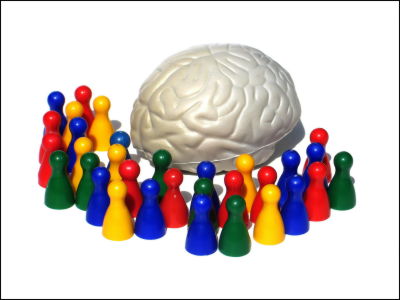Many psychology primers have incorrect academically stated contents

byTEDx Lancaster
For psychology studying human psychology, there are many people who are interested not only by experts but also by general people. Many primer books have been published in the field of psychology and many books have become best sellers, but "Many psychology primers that are becoming best sellers in the United States contain errors related to" intelligence " "The result of the investigation revealed.
Best-selling introductory psychology books give a misleading view of intelligence - Research Digest
https://digest.bps.org.uk/2018/03/08/best-selling-introductory-psychology-books-give-a-misleading-view-of-intelligence/
Researchers at the University of Utah Valley analyzed 29 bestsellers from the most famous psychology primer in the United States. As a result, we concluded that among these primer books also used in university textbooks, a quarter of the books contain fatal errors that lead to scientific misunderstanding.
According to Warner et al. Of the research group, there were 43 total inaccurate descriptions regarding 'intelligence', 129 statements with doubts about accuracy, 51 logically wrong It was said that the description was included. "Using these books may potentially plant erroneous scientific knowledge about" intelligence "for psychologists' primers."
As many errors seen,Howard Gardner"Multiple Intelligence Theory93% referred to ", andRobert StanbergMr. "The theory of intelligent piecing"89% said that they mentioned. Both are theories that tried to divide "intelligence" into plural, but these are neither mainstream nor scientific confirmation of academic society

According to Mr. Warn, the error mostly seen in the books in question was that "intelligence is not exactly measurable", but according to Warne the measurement of intelligence proved other psychological facts It seems to be easier than to do. There was also a claim that intelligence is an element that is reflected only in academic outcomes, but intelligence is also reflected in many non-academic factors such as life expectancy, death risk in car accidents, career success and so on.
In addition, "99% of human genes are common, it is not a genetic factor but an environmental factor to generate individual differences to intelligence"Richard LeuentinThere was also a book that supports Mr.'s theory, but "It is obvious that only a few genetic differences will bring about major changes," Mr. Wahn cuts down. In addition, Mr. Lewentin's doctrine is an anti-genetic movement that occurred in the Soviet Union (Luisenko's falsehood) Is sometimes referred to as "neo · Ruisenco principle" as the same thing.
Mr. Warren says that through analysis of the primer of psychology many errors are the result of disrespecting academic research on "relevance between intelligence and other factors" and "genetic influence on intelligence". "These books are British psychologists who studied genetic factors for intelligenceIan DearieMr. orRobert ProminWe ignore the results of our research at all, "Warren says.

byEx-InTransit
In the United States, more than 1 million students take lectures on introductory psychology every year. Many students only take lectures as part of the necessary subjects, and only the introductory lecture is likely to be planted as knowledge of psychology. Warren et al 's research group fears that students may have erroneous knowledge about intelligence through these incorrect psychology primers.
"It is necessary to have accurate knowledge in such an introductory learning stage in order to improve the understanding of psychology of general people," says that it is necessary to improve the quality of the psychology primer , Mr. Warren concludes.
Related Posts:
in Note, Posted by log1h_ik







